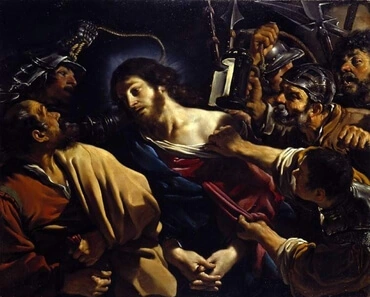Explanation of John 1:10
By Brian David

The beginning of John 1 illustrated how divine truth – which is the ultimate expression of the Lord’s love – is the actual creative force of the universe and of reality itself. That idea is reinforced here: "him" refers to Jesus, who was the physical embodiment of divine truth, which indeed made the world.
This verse offers another level, though. "World" represents the church, which is defined in the Writings as "where the Lord is known and where the Word is." By that definition a "church" can be as small as one person, or as large as billions of people worshiping through a wide variety of denominations. And the Writings tell us that the Lord has made sure that such a church always existed, from prehistoric times when the Lord offered "the Word" – His truth – to people directly up through today, when we have the Word in the form of the Bible.
But the world did not know him. At the time the Lord came among us as Jesus, people had turned away from the deeper meanings of the Word (which they then had in the form of the Old Testament), and had little to no concern for knowing the Lord. His church – the church among the Children of Israel – had turned away.
This might seem like a merely historic idea, something that happened then but has little to do with us now. But each one of us is a "church," and each one of us can know the Lord and the Word, or turn away. We all go through states when we are like the church at the time the Lord was born, and He can rebuild us now even as He rebuilt the church then. For that to happen, though, we need to turn to the Word – the Bible – and know the Lord.
(References: Apocalypse Explained 1093; Canons of the New Church 9; The Apocalypse Explained 294 [16])
Arcana Coelestia #88
88. When the spiritual man becomes celestial he is called 'God's work', because the Lord alone fought on his behalf and created, formed, and made him. This is why it is said here that 'God finished His work on the seventh day', and why it is twice said that 'He rested from all His work'. Time and again in the Prophets man is called 'the work of Jehovah's hands and fingers', as in Isaiah, when someone who is regenerate is the subject,
Thus said Jehovah, the Holy One of Israel, and He who formed him, Seek signs from Me concerning My sons, and over the work of My hands command Me. I made the earth, and created man upon it; it was I, My hands stretched out the heavens, and I commanded all their host. For thus said Jehovah who created the heavens and who is God, who formed the earth and made it: He who established it did not create it an emptiness; He formed it to be inhabited. It was I Jehovah, and no god else besides Me. Isaiah 45:11-12, 18, 21.
It is clear from these verses that the new creation, or regeneration, is the work of the Lord alone. Each of the verbs, create, form, and make, is quite different in its usage, as in these verses from Isaiah where it is said that 'He created the heavens, formed the earth and made it'. Also elsewhere in Isaiah,
Every one who is called by My name, I have created him for My glory, I have formed him, I have also made him. Isaiah 43:7.
The same applies in the previous and in the present chapters, as for example here in verse 3, 'He rested from all His work which God had created when making it'. Wherever these verbs occur the internal sense possesses a distinct concept, as it also does when the Lord is called Creator, or Former, or Maker.






